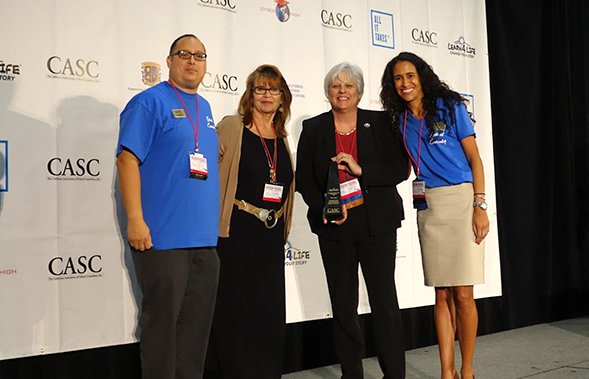SDSU Professor Awarded Counselor Educator of the Year
Trish Hatch was awarded the inaugural Counselor Educator of the Year Award from the California Association of School Counselors.

Hatch is a founding member of CASC and regularly presents at their conferences on the use of data in school counseling. She has spent more than 30 years in education working in K-12 and higher education to improve programs, policies, and practices in school counseling in California and the nation.
Hatch served as the director of the School Counseling Program in the department of Counseling and School Psychology at SDSU for the past 12 years. She now serves as executive director of the Center for Excellence in School Counseling and Leadership (CESCaL), a unit within the College of Education that seeks to educate, collaborate and improve partnerships between school counselors and administrative teams, graduate programs, and professional associations.
SDSU NewsCenter asked Hatch about her time at SDSU and why she enjoys teaching the next generation of school counselors.
1. What has been your proudest achievement while at SDSU?
Hosting the White House Convening at SDSU was a huge achievement. I am very grateful for the support of my graduate students, faculty, the College of Education, and the President’s Office in putting on the event. We are very proud of our work and its impact. After the event, we continued to support First Lady Michelle Obama’s Reach Higher Campaign which included the opportunity to advise the U.S. Department of Education, perform national research on how we prepare the next generation of school counselors, and support states to implement Reach Higher recommendations.
2. What about your field or position do you think would surprise people the most?
People may be surprised to learn that school counselors are not trained consistently nationwide. Furthermore, the role and function of school counselors varies from district to district. In some states, school counselors receive only one or two courses within their more generic “counseling” training program. Graduates of SDSU’s school counseling program are trained as school leaders ready to implement a comprehensive, evidenced-based school counseling program. They are implementing state and nationally award-winning programs and are improving the profession for the students, schools and communities they serve.
3. What inspires you to do this kind of work and why is this work important?
I am inspired each day by the work of school counselors, particularly our alumni who serve as student advocates. I am moved by their stories of supporting students and families in times of crisis and advocating for policies and practices that support student access to education. Every student deserves the opportunity to benefit from a school counseling program that supports their social, emotional, and academic development, future aspirations, and post-secondary success.
4. What do you like to do in your free time?
I travel to Greece each summer to a very special place in Santorini where I can relax and paint. I love to paint with acrylics on watercolor paper. It calms me greatly.
5. What is the best piece of advice you have ever received?
I have used two pieces of advice recently:
“Take note of when the time is right to shift from leading the way, to supporting the next generation, as they lead the way.”
“Give yourself permission to let go, to not do it all, and to practice self-care.”
6. What about this department/program makes you the proudest?
I am proud of the work we did as a program in the department to redesign the curriculum. The school counseling program at SDSU was recently highlighted by the Council of National School Counseling and College Access Organizations and recognized as by Ed Trust as one of the strongest programs in the country.
The graduate students at SDSU are sought after by school districts and are making a difference in the lives of the students they serve. We regularly receive feedback on how prepared and strong our graduates are. They have gone on to earn doctorates, become administrators, state association leaders, and professors.
7. Any other exciting news you would like to share?
I am excited about the continuing work of the CESCaL center to train school counselors in Imperial County, Fresno, and in several other under-performing schools and districts.
I am also particularly proud of the 1st Annual Supporting Access to Higher Education for Immigrant and Undocumented Students Conference Diana Camilo, the new co-director of the school counseling program, and I held last April to provide school counselors with the knowledge and skills they need to support the post secondary aspirations of immigrant and undocumented students.
The second annual conference will be held Sunday, Apr. 23 to Tuesday, Apr. 25 at SDSU. For more information or to register, visit the conference website.



